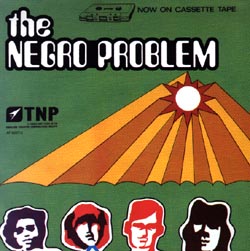
The Negro Problem deconstructs racial riffs on 'Post Minstrel Syndrome' album
By Nicky Baxter
Mark Stewart is a troublemaker: a black man who leads a white boy/girl band he's provocatively anointed The Negro Problem. The nerve! Or maybe not.
Caucasian rockers have often obsessed over the color thing, as evinced by band names like the Black Athletes, Big Black and Blackgirls, among others. So now the worm turns.
After garnering respectful reviews for its contributions to the Southern California rock compilation Silver Lake ... What Drag! the Negro Problem has released its long-awaited debut album: Post Minstrel Syndrome (Aerial Flipout).
Through 15 tracks (including two bonus numbers), singer/songsmith/guitarist Stewart, keyboardist and accordionist Jill Meschke Blair, drummer Charles Pagano and bassist Gwynne Kahn serve up some of the most intoxicating pop offerings since Arthur Lee's Love threatened to conquer L.A. back in 1965.
Simultaneously spaced-out and cunningly structured, Post Minstrel Syndrome is an anomalous mixture of folk, clean-cut pop and progressive rock doused in blotter-acid psychedelia. And while race matters, The Negro Problem's postintegrationist update of Amiri Baraka's black dada nihilism is balanced by an unfailing sense of the absurd.
A New Park
The group's irreverent reworking of Jimmy Webb's "MacArthur Park" is a good case in point, with Stewart inserting the word "crack" in place of the original "cake left out in the rain."
Musically, the quartet (with a little help from its friends) very nearly plays it straight, Stewart's tinny guitar and Blair's keyboards subbing for Webb's gloriously hammy arrangement. Yet TNP can't resist tweaking things--catch the quick Moody Blues riff at the tail end of the bridge.
As a singer, Stewart is no soul man, but neither is he a colorless rocker. Rather, he's somewhere in between: a Hootie with teeth. His articulation is for the most part clean, but he's perfectly capable of bellowing menacingly when he's got a bone to pick--which is often.
"Buzzing," perhaps the album's most attractive tune, is as hummable as a schoolyard rhyme. A chattering piano threads its way through the rhythmic push of Pagano's metronomic stickwork and Blair's granulated synth lines.
Lurking beneath the song's patina of frothy fun, however, is Stew's caustic perspective on the color question. "Go celebrate the chocolate face / Such a credit to your race," he practically snarls. "Celebrate Bill Cosby's face / Such a credit to your race. ... I think you got the wrong idea." When at the fadeout, Blair pitches in on vocals, racial rapprochement seems like a dream that could come true, but probably, as the lyrics say, we've got the wrong idea.
The acoustic quietude of "Doubting Uncle Tom" picks at racial scabs as well, with the bandleader gently but firmly probing the scarred tissue: "I've been picking dollars again / At the plantation on Wall Street. / Contradictions I eat with them. / It's an acquired taste--it's dog meat." Dreamt visions of red, black and green Rolls-Royces, Marcus Garvey on a cross and an enigmatically smiling Malcolm X bob along the singer's stream-of-consciousness lyric.
More Than Race
Still, race is not all that matters to TNP; indeed, the band enjoys a stroll on the psychedelic side as much as any XTC devotee. Equal parts the Doors circa "The End" and the Beatles in Pepperland, "Witch" commences with some fright-night keyboards buttressed by wiry, Robbie Krieger-styled guitar, portentous bass and funereal drumming.
Stewart is at his best here, juxtaposing Robert Johnson's hell-hounded brilliance ("Come on in my kitchen, 'cause it's gonna be rainin' outdoors") with some of his own mojo musings ("Could that be Jesus / In front of 7-Eleven. / He's wiping off your windshield / So you can get to heaven"). His vocal performance is masterful, speak-singing like a backwoods preacher one moment, sounding demon-possessed the next.
Post Minstrel Syndrome is anything but a fluke. The songs are sunny enough on the surface to appeal to pop fans yet smart enough to earn interest from alterna-types willing to exercise their imaginations. Ultimately, however, the success of Stewart and company will ride on the willingness of a wider audience to confront the band's take on the race conundrum head-on.
Sadly, just under 1,000 days before the new millennium, W.E.B. DuBois's 1903 prediction that the problem of the 20th century will be the color line may well be true of the 21st century as well.
[ San Jose | Metroactive Central | Archives ]
![[Metroactive Music]](/music/gifs/music468.gif)